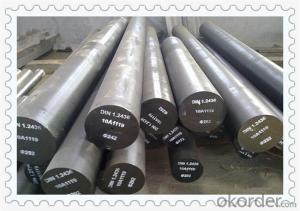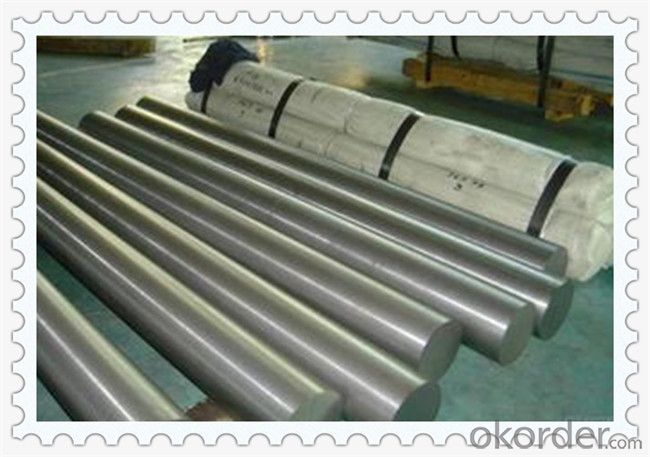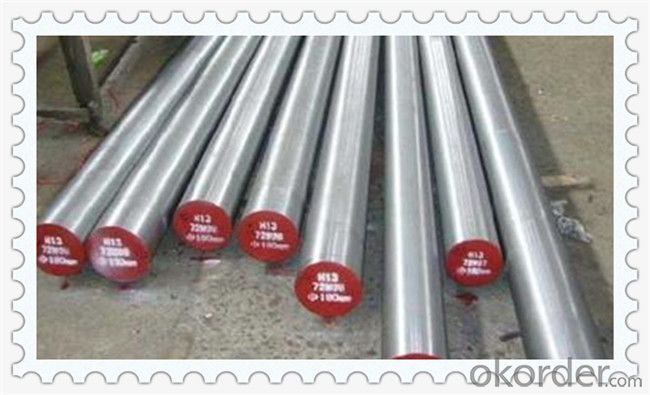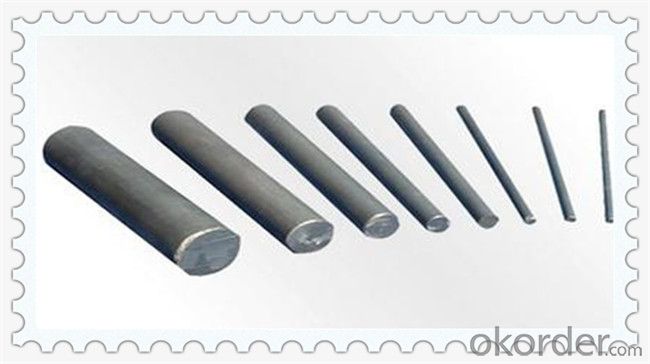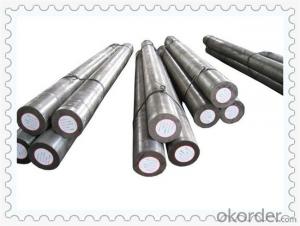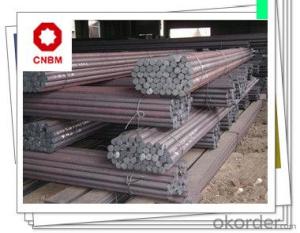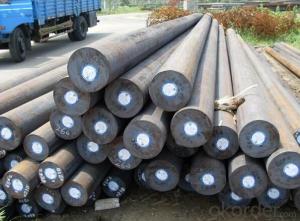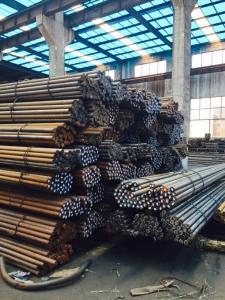C40 Carbon Steel Round Bars
- Loading Port:
- China main port
- Payment Terms:
- TT OR LC
- Min Order Qty:
- 30 m.t.
- Supply Capability:
- 10000 m.t./month
OKorder Service Pledge
OKorder Financial Service
You Might Also Like
C40 Carbon Steel Round Bars
Product Details
1. Steel manufacturing process: EAF+LF+(VD)+CCM+Hot rolled+(cold drawn)/(forged)
2.Ultrasonic test standard: SPE1921-GR3, CLASS C/C
3.Chemical composition
C | Si | Mn | S max | P max | B |
0.37-0.44 | 0.17-0.37 | 0.35-0.90 | 0.035 | 0.035 | 0.0008-0.003 |
4.Machanical composition
Yield strength(MPa) | Tensile strength(MPa) | Elongation(%) | Reduction of area(%) | AKV(J) | Hardness(HB) |
335 | 570 | 219 | 45 | 47 | 217 |
5.Sizes detailes
| Sizes detalis | diameter | 10-310mm |
| Sizes detalis | length | 3-12m(canbe customerized) |
| Sizes tolerance | length | +/-100mm(max) |
| Sizes tolerance | diameter | +/-2mm(max) |
| Sizes tolerance | Straightness | 3mm/m(max) |
Products Show
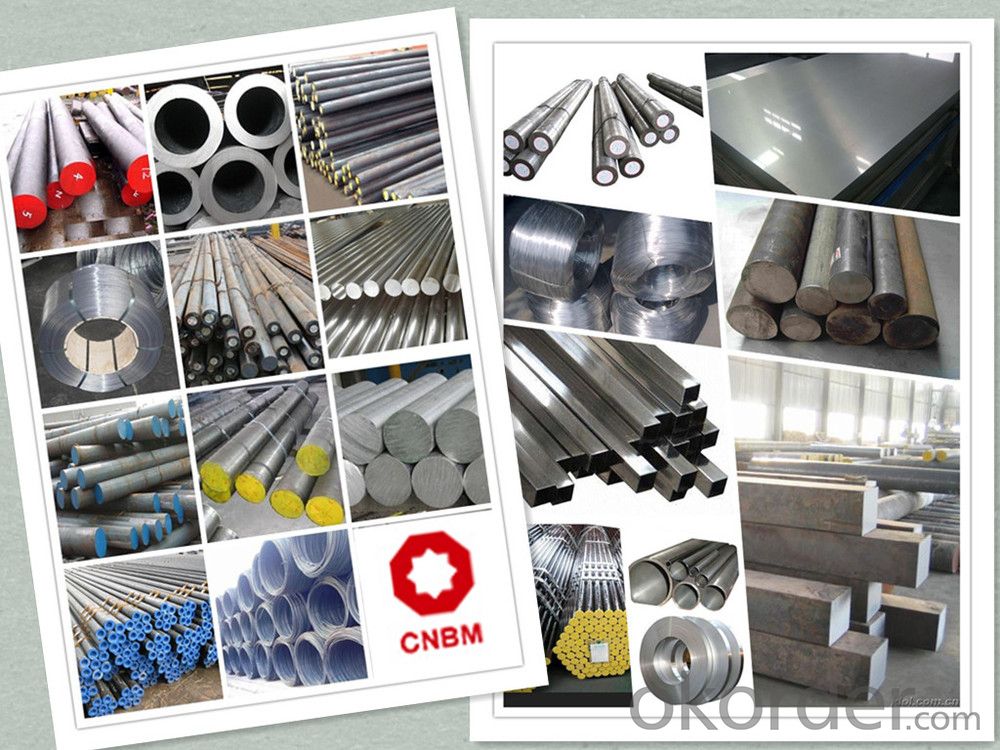
Product Overviews
| Product Name | Typical Grades | Diameter(mm) | Standard adopted |
| Carbon Steel | 20 (1020/S20C/C22) | Ø16-Ø300 |
GB/SAE/JIS/DIN
|
| 40 (1040/S40C/C40) | |||
| 45 (1045/S45C/C45) | |||
| Bearing Steel | GCr9 (51100/SUJ1) | Ø12-Ø250 | |
| GCr15 (52100/SUJ2/100Gr6) | |||
| GCr9SiMn (A485-Gr.1/SUJ3) | |||
Cr-Mo Steel | 20Cr (5120/SCr420H/20Cr4) | Ø12-Ø250 | |
| 40Cr (5140/SCr440/41Cr4) | |||
| 42CrMo(4140/SCM440/42CrMo4) | |||
| Gear Steel | 20CrNiMo | Ø16-Ø600 | |
| 20CrMn(5115/SMnC420/20MnCr5) | |||
| 20CrNiMo(8620/SNCM220/20CrMiMo2) |
Application
| Carbon Steel | Mold bottom, Plastic mold, Construction machinery parts Automobile parts, Security grills, Screens, Construction |
| Bearing Steel | Aerospace, Navigation, Nuclear energy, Chemical industry Electronic information, Petrochemical, Instrument and meter Transportation |
| Cr-Mo Steel | Mechanism & Fasteners gear, Stressed components for vehicles Engines and machines, Parts of larger cross-section |
| Gear Steel | All kinds of gears, Statically and dynamically stressed component for vehicles Engines and machine, Larger cross-section parts, Crankshafts |
Work Shop
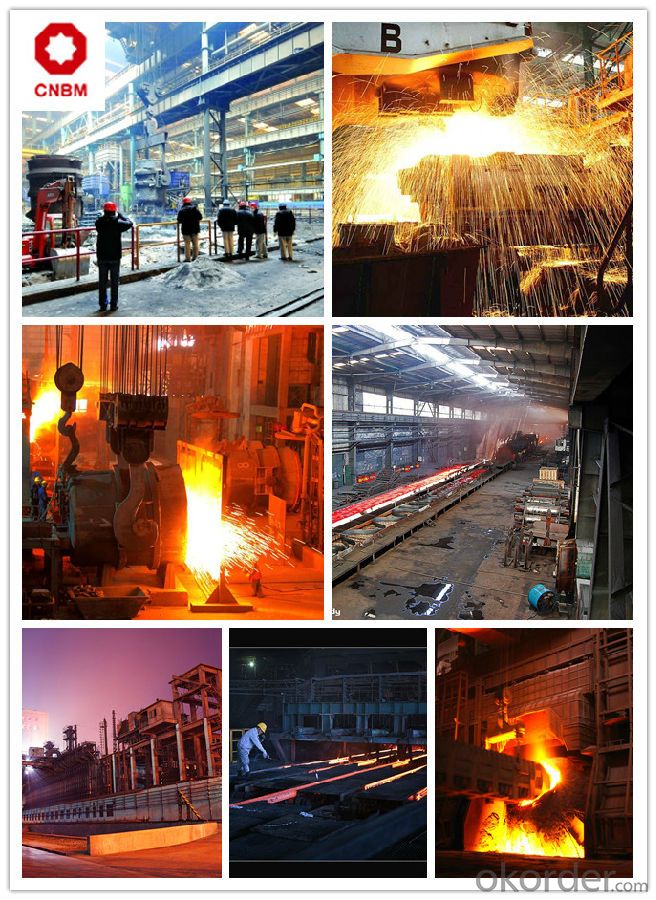
Company Information
CNBM International Corporation is the most important trading platform of CNBM group.
Whith its advantages, CNBM International are mainly concentrate on Cement, Glass, Iron and Steel, Ceramics industries and devotes herself for supplying high qulity series of refractories as well as technical consultancies and logistics solutions.


FAQ
1, Your advantages?
professional products inquiry, products knowledge train (for agents), smooth goods delivery, excellent customer solution proposale
2, Test & Certificate?
SGS test is available, customer inspection before shipping is welcome, third party inspection is no problem
3, Factory or Trading Company?
CNBM is a trading company but we have so many protocol factories and CNBM works as a trading department of these factories. Also CNBM is the holding company of many factories.
4, Payment Terms?
30% TT as deposit and 70% before delivery.
Irrevocable L/C at sight.
5, Trading Terms?
EXW, FOB, CIF, FFR, CNF
6, After-sale Service?
CNBM provides the services and support you need for every step of our cooperation. We're the business partner you can trust.
For any problem, please kindly contact us at any your convenient time.
We'll reply you in our first priority within 24 hours.
Packaging & Delivery
1, Packaging: seaworthy package or as required
2, Delivery: 35-45 days or based on quantity
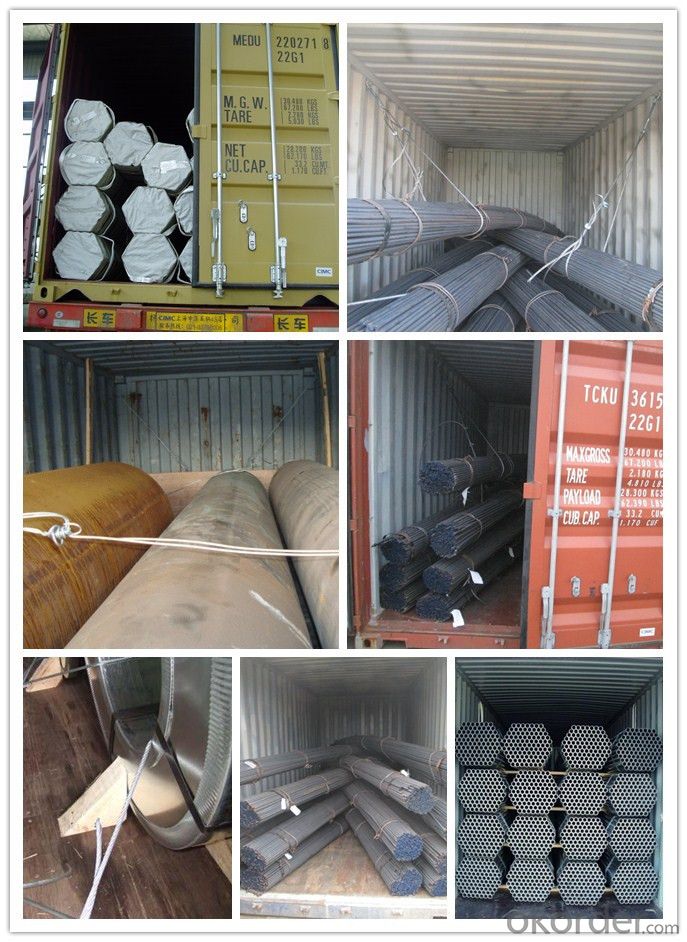
- Q: Can steel round bars be threaded or machined?
- Yes, steel round bars can be threaded or machined.
- Q: Can steel bars be replaced by large screws in the concrete floor?
- In theory, how big a round steel will have to replace the large thread steel, and if it is cast, then still better to use thread steel, screw steel tensile resistance than round steel by strong
- Q: How do you calculate the weight of a steel round bar based on its length and diameter?
- To calculate the weight of a steel round bar based on its length and diameter, you can use the following equation: Weight = (π/4) x (Diameter^2) x Length x Density Here, π represents the mathematical constant pi (approximately 3.14159), Diameter is the measurement of the steel round bar across its widest point, Length is the overall length of the bar, and Density is the density of steel, which is typically around 7850 kilograms per cubic meter. To calculate the weight, first square the diameter, then multiply it by the length and density. Finally, multiply the result by π/4 to obtain the weight of the steel round bar in the desired units (typically kilograms or pounds). It's important to note that this equation assumes the steel round bar is a solid cylinder with a uniform diameter. If the bar has any variations or irregularities, the weight calculated using this equation may not be entirely accurate.
- Q: How is the weight of a steel round bar calculated?
- The weight of a steel round bar is calculated using the formula: weight = volume × density. The volume of a round bar is determined by multiplying the cross-sectional area (πr^2) with the length of the bar. The density of steel is usually known, so by plugging in these values, we can calculate the weight of the steel round bar.
- Q: How are steel round bars used in the manufacturing of conveyor systems?
- Steel round bars are commonly used in the manufacturing of conveyor systems as they provide the necessary strength and durability for supporting heavy loads, guiding conveyor belts, and maintaining stability. These bars are often used as support beams, rollers, and shafts within the conveyor system, ensuring efficient movement of materials along the production line.
- Q: Can steel round bars be machined?
- Yes, steel round bars can be machined. Machining is a process that involves the removal of material from a workpiece to create the desired shape, size, or finish. Steel round bars are commonly machined to create various components, such as shafts, bolts, and fasteners. Machining processes such as turning, milling, drilling, and grinding can be used to shape and cut the steel round bars. However, the machinability of steel can vary depending on factors such as the composition and hardness of the steel, cutting tools, and machining parameters. It is important to use appropriate machining techniques and tools to ensure accurate and efficient results while machining steel round bars.
- Q: What are the different surface treatments available for carbon steel round bars?
- Some of the different surface treatments available for carbon steel round bars include hot dip galvanizing, electroplating, black oxide coating, powder coating, and painting. These treatments help to improve the appearance of the steel, protect it from corrosion, and enhance its durability.
- Q: Can steel round bars be used in the production of gears?
- Yes, steel round bars can be used in the production of gears. Steel round bars are often used as a raw material in gear manufacturing due to their high strength, durability, and ability to withstand heavy loads and high temperatures. The round bars can be machined or forged into the desired gear shape, ensuring precise dimensions and accurate teeth profiles. Steel round bars also offer excellent wear resistance and can be heat-treated to further enhance their mechanical properties, making them a suitable choice for various types of gears, including spur gears, helical gears, bevel gears, and worm gears.
- Q: Can steel round bars be used in the mining industry?
- Yes, steel round bars can be used in the mining industry. Steel round bars are commonly used in various mining applications due to their strength, durability, and resistance to corrosion. They are used in the construction of mining equipment, such as crushers, conveyors, and drill rods. Steel round bars are also utilized in the production of support structures, such as mine shafts and tunnels, as well as in the fabrication of drilling tools and machinery. Their versatility and high tensile strength make them an ideal choice for the demanding and harsh conditions often encountered in the mining industry.
- Q: How are steel round bars used in the manufacturing of agricultural implements?
- Due to their durability, strength, and versatility, steel round bars are widely used in the manufacturing of agricultural implements. Typically made of carbon steel, these bars offer excellent resistance to wear and tear, making them ideal for heavy-duty applications in the agricultural industry. Plows, an essential tool for breaking up and turning over soil, heavily rely on steel round bars. These bars are used to construct the plow's main framework, ensuring it can withstand the high levels of force and pressure exerted during tilling. Similarly, harrows, which cultivate the soil after plowing, also benefit from the use of steel round bars. These bars provide the necessary strength to withstand rigorous use without bending or breaking, guaranteeing their longevity and effectiveness. Apart from plows and harrows, steel round bars find common usage in the fabrication of other agricultural implements like cultivators, seeders, and sprayers. These implements require sturdy and durable components to endure the demanding conditions of agricultural operations. Steel round bars provide the strength and structural integrity needed for these implements to perform their intended functions effectively. Furthermore, livestock equipment such as gates, fences, and cattle panels also rely on steel round bars. These components must be strong and robust to contain livestock and withstand their movements and force. Steel round bars fulfill these requirements, ensuring the safety and security of animals and the durability of the equipment. In conclusion, steel round bars play a crucial role in the manufacturing of agricultural implements. Their durability, strength, and versatility make them an ideal choice for creating sturdy and reliable equipment that can withstand the demanding conditions of the agricultural industry.
Send your message to us
C40 Carbon Steel Round Bars
- Loading Port:
- China main port
- Payment Terms:
- TT OR LC
- Min Order Qty:
- 30 m.t.
- Supply Capability:
- 10000 m.t./month
OKorder Service Pledge
OKorder Financial Service
Similar products
Hot products
Hot Searches
Related keywords
